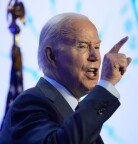Omission of THAAD missile launchers in reporting should not burden S.K.-U.S. alliance
Omission of THAAD missile launchers in reporting should not burden S.K.-U.S. alliance
Posted June. 01, 2017 07:16,
Updated June. 01, 2017 07:27
Chief presidential press secretary Yoon Young-chan commented on the stir caused by omission of four missile launchers for the Terminal High Altitude Area Defense anti-missile system in the Defense Ministry’s reporting to the new administration on Wednesday. “We confirmed that all the wording ‘six launchers being stored at an unidentified military camp’ that existed in a draft of the report was deleted in the course of review, and the information was ambitiously described to only suggest that (THAAD) has been deployed in South Korea,” Yoon said. He indicated that the presidential office is considering the issue very seriously as evidenced by the fact it is announcing findings instantly just one day after starting its own investigation into the matter. The fact the presidential office has disclosed the situation during the Defense Ministry’s previous reporting to the presidential office in details by the hour, and stated that Defense Minister Han Min-koo failed to debrief the matter to Chung Ui-yong, head of the presidential National Security Office, indicates that the presidential office is considering of the omission in reporting a very grave issue comparable to disruption of state discipline.
No matter how the controversy has been caused, it is true that the Defense Ministry provided a cause for dispute. If the leadership of the Defense Ministry intentionally refrained from reporting the matter in a bid to push ahead THAAD deployment in light of the new administration’s stance that is critical of the missile defense system, it constitutes an act disrupting the principle of state that damages the authority of the president as commander-in-chief. If the ministry properly and adequately considered the high level of sensitivity that the new administration feels towards the THAAD system, the defense minister should have given careful and detailed explanations to the new administration. The new administration should carefully check whether the outgoing defense minister became negligent in anticipation of the imminent end of his term, or attempted to make THAAD deployment a completely irreversible and done deal before his departure.
However, we doubt whether the Defense Ministry had intention to hide the matter, which would inevitably be made public soon because the issue had already been publicized by the media. It is hard to readily understand the new administration’s assumption that the ministry intentionally omitted the four missile launchers in its reporting just because the commander-in-chief has been replaced, no matter how military discipline has been eased and compromised. There is a possibility that working-level officials could have been confused or made a mistake in the course of reporting, because it entailed a process in which six missile launchers were brought into South Korea, two of them were deployed to Seongju, North Gyeongsang Province, and four additional launchers have yet to be deployed.
The bigger problem is whether South Korea can afford to engage in internal conflict over such an issue at this critical point in time. North Korea is firing missiles almost every week for a month even though U.S. aircraft carriers have been deployed to the Korean Peninsula. The South Korean public get anxious to see that the Moon Jae-in administration feels so sensitive about the minimum of the necessary defense systems despite the fact South Korea has no other countermeasures against the North’s nuclear weapons and missiles. It is worrisome that the new administration might end up demotivating the military might by openly cornering the military that serves as the guardian for national defense against the North, and raising issue with the omission in reporting.
China already expressed “grave concern” over the stir over omission in reporting of the four missile launchers on Wednesday, urging South Korea to immediately revoke THAAD deployment. In contrast, the U.S. Defense Department said, “The THAAD deployment process in South Korea was very transparent.” Does Seoul need to send a signal negative to the South Korea-U.S. alliance to Washington particularly at a time when the two allies must coordinate and dissolve dispute ahead of the first bilateral summit between their new leaders. The President and the presidential office, who are obliged to protect the lives and property of the Korean people, are urged to behave scrupulously by giving consideration to the gravity of matters particularly when it comes to foreign affairs and national security issues.







